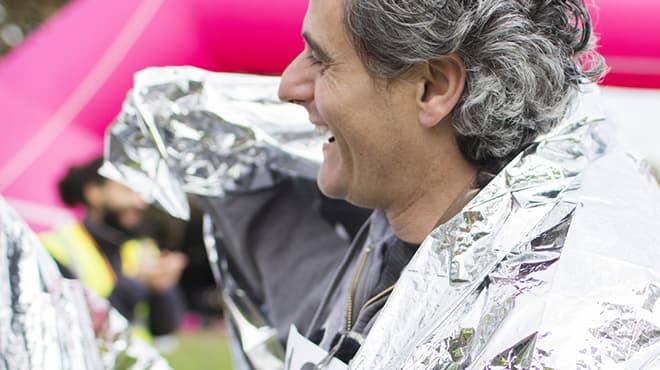-
Featured News
Ready to run: Post-race recovery tips for runners

Congratulations! You've just finished a marathon or other running event.
Now recovery begins. Try this three-phase approach for best results:
Phase one: Immediately after you finish
Once you've crossed the finish line, it's imperative to focus on recovery.
You can start swapping stories as soon as you've taken a few basic steps:
- When you stop running, your body immediately enters recovery mode. Even on a warm day, you can feel yourself getting cold and clammy. Avoid this by wrapping up in a foil blanket or other covering, then changing into warm, soft clothes — including footwear — as soon as possible. Injuries aside, another pair of shoes is helpful to keep your feet from swelling and give them much-needed support.
- Start the rehydration process as quickly as you can. Ideally, you should drink 16–20 ounces of fluid for every pound you lost. When you can, weigh yourself to help plan your fluid intake.
- Find a way to lie down and put your feet up. After several hours of hard work, your body needs help recovering. Besides, this is just plain relaxing. Try keeping your feet elevated for 15–25 minutes. It's recommended you do this several more times during the day.
- You'll need a recovery meal containing protein, preferably in liquid form. Avoid processed fruit juices or other sugary substitutes. Instead, consume something you enjoy that's easy on your stomach. Use what has worked in training, but make sure you have something to eat within the first 30 minutes after your event.
- If you've sustained an injury, such as a blister or muscle strain, now you can begin assessing the extent of the damage and seek help. Your brain will be much clearer, and if you need to go somewhere or wait in line, at least your basic needs will have been met.
Phase two: 12–24 hours post-race
By now, you've found your friends and family. Maybe you're even home or at your hotel and are thinking about your next meal.
Here are some key things you can do:
- Take a shower or bath to rejuvenate your body and help identify any issues.
If possible, consider a cool or cold bath to help promote recovery. You also can add some light, static stretching that should be easy and comfortable on your muscles, and they should feel better when done. - Focus on a proper meal.
As you choose your foods, try to keep them reasonably healthy, and drink lots of water. - You've earned the right to celebrate, but don't overdo it.
Your body is still recovering. Limit the amount of alcohol you consume and how long you stand on your feet. - Get some well-deserved sleep.
You'll likely be so tired that falling asleep won't be an issue. The problem is you'll probably be so sore that staying asleep could be harder than you think. Put plenty of fluids — and maybe even a snack — on your bedside table, and keep your feet elevated.
Phase three: Two–three days post-race
After 72 hours, you'll be through the toughest part of your recovery process. But some of the greatest need for recovery takes place during this period. Once the adrenaline wears off, the fatigue and soreness will be all that's left.
These tips can help you weather this last phase:
- Do your best to avoid being stationary, other than sleeping.
Light walking, an easy dip in the pool, or a short spin on an exercise bike will help your muscles flush out toxins and aftereffects of the race. Frequent rest will be needed, but total rest is your enemy here. - Continue to eat healthy.
Focus on proteins and quality carbohydrates, such as fruits and vegetables, especially when your body is vulnerable. A treat or two is all right, but try to save the serious snack attacks until you can savor the food. - Lightly working on your calves, feet, hamstrings, glutes and quads is another great way to stay loose and promote recovery.
Whether you use your hands or a tool, taking the time to focus on your trouble areas will be beneficial. Keep it light; it should feel good, not hurt. Going too deep or hard with this work can make you sorer.
Wrapping up recovery
Once you've made it through the first three days of recovery, your work isn't done. Your body is still a long way from being where it was before the race. You'll want to continue staying active by walking or including some cross-training into your post-race training regimen. You should wait at least one to two weeks before returning to running if you haven't competed in many races before.
Joel Luedke is an athletic trainer in Sports Medicine in La Crosse, Wisconsin.
This article originally appeared on the Mayo Clinic Health System blog.







